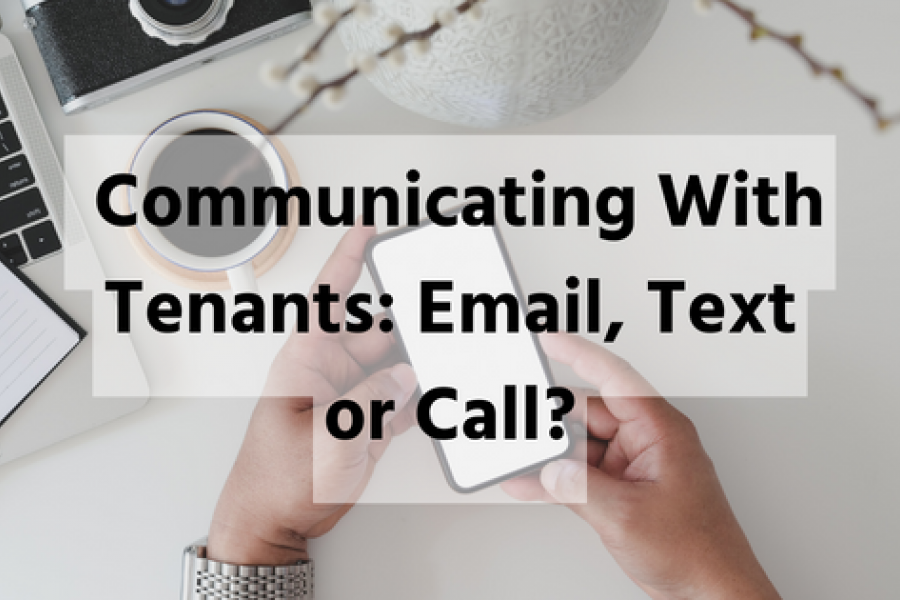
Effective communication is the foundation of a successful landlord-tenant relationship. Whether conveying essential information, addressing concerns, or building a sense of community, the method of communication a landlord chooses to employ with tenants plays an essential role.
Landlords and property management professionals often face the dilemma of choosing between email, text messaging, and calls. Each mode of communication has its benefits, and the key lies in understanding when to use them.
Email Communication
Email communication has become an integral part of our daily lives, both personally and professionally. As a landlord or rental property manager, email can be a way to communicate effectively with your tenants.
Pros of Email Communication
Documentation and formality: Email provides a written record of tenant communication that can be easily referenced in the future. It also adds a level of formality to your interactions with tenants and upholds a professional relationship.
Detailed Information Sharing: Email is a more formal avenue for you to share detailed information, such as rental property policies or maintenance updates, with your tenants. This ensures that both landlord and tenant are on the same page and reduces the chances of miscommunication.
Attachments and Links: You can easily attach important documents or links to your email, making it a convenient way to share information with your tenants. This also eliminates the need for physical copies and reduces paper waste.

Cons of Email Communication
Potential for Oversight: With the large amount of emails your tenant may receive on a daily basis, there is a risk of important messages getting lost or overlooked. This can lead to tenants missing out on relevant information or updates.
Lack of Immediate Response: Unlike a verbal conversation between a landlord and tenant, email communication does not guarantee an immediate response. Tenants may not regularly check their emails or may have other priorities that delay their responses. This can be frustrating when urgent matters need to be addressed.
Tips for Effective Email Communication
- Use clear and concise subject lines.
- Keep emails brief and to the point.
- Use bullet points or numbered lists.
- Avoid using all caps or too many exclamation marks.
- Follow up with tenants if necessary.
- Maintain a professional tone when communicating with tenants.
Text Communication
Texting has become a popular form of communication in both personal and professional settings. Many landlords and property managers have also turned to text messaging as another way to reach their tenants.
Pros of Text Communication
Response Time: Text messages are usually read and responded to by tenants more quickly than emails. This can be helpful for concerns that require immediate action from your tenant. It’s also a more convenient way for them to communicate with you for smaller matters like minor complaints.
Ease of Use: Text messaging is simple, fast, and convenient for both landlords and tenants. It can also be used for quick updates or reminders, such as for rent payment, without taking up too much time.
Cons of Text Communication
Limited Length and Detail: Text messages usually have a character limit, making it difficult to convey detailed or complex information with tenants. This can be a disadvantage when trying to explain important information, like details of their rental agreement.
Informality and Misinterpretation: Texting is often seen as more informal than other forms of tenant communication, which can lead to misinterpretation of tone and intent. It's important to use clear language and avoid sarcasm or humor that may not translate well in writing to your tenants.

Tips for Effective Text Communication
- Use proper grammar and punctuation.
- Avoid sending text messages at inconvenient times, such as late at night or early in the morning.
- Avoid using slang or abbreviations that may be unfamiliar to your tenants.
- Texting may not be the best platform for discussing sensitive or complex issues that require more detailed communication with your tenants. In these cases, it's best to schedule a call or in-person meeting.
Phone Calls
Phone calls are becoming less popular nowadays, but they are still an important form of tenant communication when it comes to managing rental properties.
Pros of Phone Calls
Personal Connection: As a landlord, speaking directly to your tenants over the phone allows for a more personal and human connection, which can be beneficial in building a positive landlord-tenant relationship.
Real-time Interaction: Phone calls allow for immediate, effective communication between landlords and tenants, making it easier for you to address any questions or concerns your tenants may have about the lease or the property.
Cons of Phone Calls
Time-Consuming: Phone calls can be time-consuming, especially if you have multiple properties and tenants, or if you’re not yet working full-time as a landlord. This can make it difficult to schedule a convenient time for both landlord and tenant to talk.
Potential for Missed Calls: When a tenant misses your call, there is a risk of important messages not being received or callbacks not being made. This can lead to delays in addressing urgent matters.
Tips for Effective Phone Communication : Schedule calls in advance. This allows both landlord and tenants to prepare for the call and ensures that it takes place at a convenient time for everyone.
- Have all necessary information and documents on hand before making a call so that you can use your time to communicate effectively.
- Make sure to actively listen and understand your tenant's concerns before responding.
- It's important to keep a log or record of any important information discussed during phone calls for future reference.
- After a phone call, it's helpful to send a follow-up email or text message to your renters summarizing the conversation and any action items discussed.

When to Text, Call or Email
- Text messages are a good option for landlords to communicate time-sensitive information that requires immediate attention.
- Calls excel in handling complex issues or disputes that benefit from real-time, nuanced conversation.
- Emails provide a formal and documented means for landlords to convey detailed information, such as lease agreements or important notices.
Bottom Line
This question has no single answer. Whether it's reminders for rent payments, discussing property renovations, or sending a notice to a tenant, by utilizing various forms of effective communication with your renters, landlords can ensure that they are providing information effectively for any situation and upholding their landlord-tenant relationship. Remember to always maintain a professional tone and be considerate of your tenant's time when choosing how to reach out.
For personalized property management solutions, connect with us at Campus Connection Property Management. Enhance your tenant communication strategy and maintain professionalism while prioritizing tenant's time.
